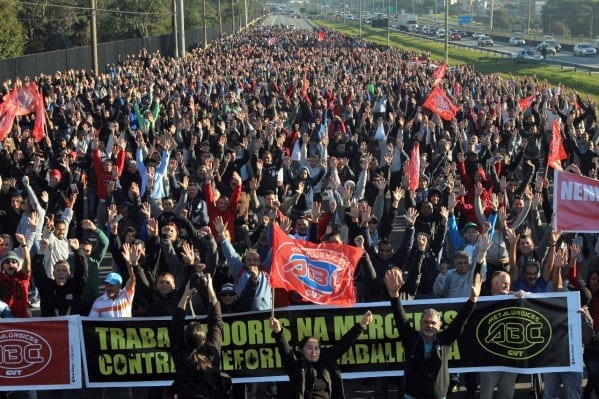Brazil workers and their unions are outraged and vowing further protests over a draconian labor law reform the Senate passed yesterday that will weaken labor regulations as well as restrict financing for unions.
The law, which President Michel Temer supports and is expected to sign, will remove all restrictions on outsourcing, dismantle labor rights, including provisions on vacations, overtime and working hours, give more freedom to employers to negotiate individually with workers rather than collectively through unions, and eliminate the “union tax” paid by all formal-sector workers, which is the principal form of financing for union activities in Brazil.
Workers across Brazil rallied over the past weeks to urge lawmakers to vote against the so-called labor law reform bill, which will mean “lay-offs, end of formal employment and legalization of freelancers,” says Central Union of Workers (CUT) President Vagner Freitas.
“The problem already begins with the name, the lie that there is around [it],” Sérgio Nobre, secretary-general of CUT told thousands of metalworkers gathered in São Paulo on Tuesday. “‘Reform’ gives the impression that it is a good thing.” Nobre said the law would serve the interests of large multinational companies, not workers.
Workers across Brazil launched a 24-hour general strike in April, after the lower house approved the bill. Brazil’s Congress debated the law without the participation of CUT or any trade union opposed to its provisions, says Nobre.
Young people, specifically young black workers, will be especially harmed, because young workers are primarily employed in precarious jobs and are the majority of the unemployed, Julia Reis Nogueira, CUT national secretary of racial equality said in May.
The International Labor Organization (ILO) said the law’s provisions violate international conventions signed by Brazil.
Senators opposed to the bill tried to block the vote with a sit-in at the Senate president’s rostrum, but the session resumed after a six-hour delay and lawmakers passed the law by 50-26.
Temer was indicted in the Supreme Court in June by the independent public prosecutors’ office, and on Monday, a congressman leading a lower house committee on the president’s alleged corruption called on lawmakers to allow Brazil’s top court to try the case.

